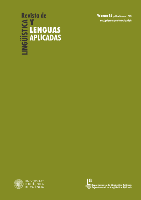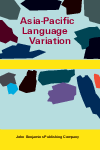
Euskera
metrics 2024
Fostering Understanding of Euskera and Its Cultural Significance
Introduction
Euskera is a distinguished academic journal dedicated to the study and promotion of the Basque language and culture, published by EUSKALTZAINDIA, the Royal Academy of the Basque Language. With the ISSN 0210-1564, this journal serves as a pivotal platform for researchers, linguists, and cultural scholars to disseminate cutting-edge research and discussions focused on linguistics, language preservation, and Basque identity. Although the journal is not classified as Open Access, it provides comprehensive insights into the advancement of Basque studies and contributes significantly to the field’s academic discourse. Aimed at fostering a deeper understanding and appreciation of the linguistic and cultural heritage of the Basque people, Euskera plays an invaluable role in connecting scholars and practitioners, promoting vibrant scholarly exchanges that enrich both local and global perspectives.
Metrics 2024
 -
- 0.10
0.10 -
- -
-Metrics History
Rank 2024
JCI (Web Of Science)
Quartile History
Similar Journals

Lingua Italiana
Advancing Scholarship in Italian Linguistics and LiteratureLingua Italiana is a distinguished journal published by FABRIZIO SERRA EDITORE, dedicated to the exploration and advancement of the Italian language in both its literary and linguistic contexts. With its ISSN 1724-9074 and E-ISSN 1826-8080, Lingua Italiana aims to foster scholarly dialogue among researchers, professionals, and students invested in Italian studies, linguistics, and cultural discourse. Located in Pisa, Italy, the journal provides a platform for rigorous peer-reviewed articles that reflect the latest research, theoretical frameworks, and critical analyses. Although it operates under a subscription model, the journal remains an invaluable resource due to its commitment to quality content and comprehensive coverage of contemporary issues affecting the Italian language. By contributing to Lingua Italiana, authors can not only enhance their academic footprint but also engage with a global audience interested in rich linguistic heritage and its evolution.

Jezikoslovlje
Connecting Researchers to Contemporary Linguistic ChallengesJezikoslovlje, published by the Josip Juraj Strossmayer University, Faculty of Philosophy in Croatia, is an essential publication in the field of Linguistics and Language Studies. Launched in 2008 and extending its contributions to the academic community through 2024, this journal addresses a spectrum of linguistic research, facilitating scholarly dialogue around both theoretical and applied aspects of language. With a current Scopus ranking placing it in the 54th percentile in the Arts and Humanities and the 50th percentile in Social Sciences, Jezikoslovlje serves as a vital resource for researchers and students looking to engage with contemporary linguistic issues. Although it operates under a traditional access model, its indexed presence and rigorous peer-review process ensure that published works maintain a high scholarly standard, inviting contributions that advance understanding in this dynamic discipline. The journal's commitment to fostering knowledge in linguistics makes it a significant platform for academics in Croatia and beyond.

Revista de Linguistica y Lenguas Aplicadas
Exploring the Dynamics of Language and CommunicationRevista de Linguistica y Lenguas Aplicadas, an esteemed journal published by UNIV POLITECNICA VALENCIA, EDITORIAL UPV, is a pivotal resource in the field of linguistics and applied languages. Since its inception, the journal has embraced Open Access publishing since 2006, ensuring that its rich repository of research is readily available to a global audience of researchers, academics, and language professionals. Headquartered in Valencia, Spain, the journal contributes significantly to the advancement of linguistics knowledge, boasting a respectable ranking within the Q3 quartile for Linguistics and Language (2023) according to Scopus metrics. It covers a diverse range of topics and methodologies, engaging readers through its commitment to scholarly rigor and innovation. The journal is uniquely positioned to inform and inspire essential discussions from 2015 to 2024, making it a vital platform for emerging linguists and seasoned scholars alike, as they explore the evolving landscapes of language and communication.

Fontes Linguae Vasconum
Connecting Scholars Through Linguistic InsightsFontes Linguae Vasconum, published by GOV NAVARRA, DEPT CULT SPORT & YOUTH DIR GENERAL CULT-INST PRIN VIANA, stands as a pivotal academic resource in the field of Linguistics and Language studies. Established as an Open Access journal since 2007, it ensures wide dissemination of research findings and promotes collaborative dialogue among scholars, researchers, and students. With a growing impact factor reflected in its Q2 category ranking in Linguistics and Language for the year 2023 and an impressive standing in Scopus with a rank of #443 in Arts and Humanities, the journal serves as a significant platform for advancing knowledge derived from the rich linguistic heritage of the Basque language and beyond. The journal is dedicated to publishing high-quality research articles, reviews, and discussion pieces that explore diverse aspects of language, fostering connections between contemporary linguistic theories and their practical implications. Based in Pamplona, Navarra, Spain, Fontes Linguae Vasconum continues to evolve, providing researchers and academics with essential insights and a valuable reference in the vibrant field of linguistics.

Dialectologia
Advancing Research in Dialectology and SociolinguisticsDialectologia, published by the Universidad de Barcelona, Facultad de Filología, is a distinguished academic journal dedicated to the fields of linguistics and language studies. Since its inception in 2008, this Open Access journal has made significant strides in disseminating knowledge, fostering scholarly communication, and promoting research in dialectology and sociolinguistics. With its current classification in the Q3 quartile of linguistics and language, and Scopus rankings placing it in the 32nd and 29th percentiles within the Arts and Humanities and Social Sciences, respectively, Dialectologia plays a crucial role in advancing the study of language variation and change. The journal’s commitment to providing a platform for innovative research is underscored by its accessibility to a wide audience, ensuring that researchers, professionals, and students alike can engage with and contribute to contemporary discourse in language studies. Based in Barcelona, Spain, Dialectologia not only enriches academic literature but also connects a global community of language scholars through its compelling and diverse contributions.

Onomazein
Bridging Cultures Through the Study of LanguageOnomazein is an esteemed academic journal published by the Pontificia Universidad Catolica de Chile, Facultad de Letras, featuring a dedicated focus on the field of Linguistics and Language. With an established presence since 2011, it reaches an international audience and is recognized for its contributions within the Q2 category of Linguistics as per the latest rankings, underscoring its significance in the academic community. The journal holds a commendable position in Scopus, ranking 470th out of 1088 in Arts and Humanities and 549th out of 1167 in Social Sciences, reflecting its relevance and impact in the domain. Although it does not currently offer an open access option, Onomazein remains a critical platform for researchers, professionals, and students seeking to advance their understanding of linguistic phenomena and engage with contemporary debates in language studies. For submissions and more information, please refer to the university’s address at AV Vicuna Mackenna 4860, Santiago, Chile.

Linguas e Instrumentos Linguisticos
Empowering Researchers with Scholarly Linguistic AnalysisLinguas e Instrumentos Linguisticos is a premier academic journal dedicated to the exploration and analysis of language and linguistic tools, published by RG EDITORA in collaboration with Universidade Estadual de Campinas (UNICAMP). With a focus on enhancing the understanding of linguistic structures and applications, this journal serves as a vital resource for researchers, professionals, and students interested in the dynamics of language within various contexts. Although currently not open access, it offers a wide array of scholarly articles that delve into innovative methodologies, theoretical frameworks, and empirical studies in linguistics. Operating out of São Paulo, Brazil, Linguas e Instrumentos Linguisticos fosters a rich academic dialogue and is committed to advancing the field of linguistic research, making it an essential read for anyone engaged in linguistic studies.

Studia z Filologii Polskiej i Slowianskiej
Pioneering Research in Slavic Linguistic PhenomenaStudia z Filologii Polskiej i Slowianskiej is a prominent journal published by the Polish Academy of Sciences, Institute of Slavic Studies, focusing on the rich and diverse field of linguistics and language studies, particularly within the Slavic context. With the ISSN 0081-7090 and E-ISSN 2392-2435, this open-access journal has been a valuable resource for researchers, professionals, and students since its transition to an open-access model in 2014. It features rigorous peer-reviewed articles that contribute to the understanding of linguistic phenomena and cultural narratives across Slavic languages. Recognized within the Q3 quartile of linguistics and language in 2023, it ranks at the intersection of arts, humanities, and social sciences, providing insights that echo through disciplines such as sociolinguistics, psycholinguistics, and philology. In its ongoing publication trajectory from 2011 to 2023, Studia z Filologii Polskiej i Slowianskiej continues to foster academic discourse and collaboration, positioning itself as a key player in the global linguistic community.

Asia-Pacific Language Variation
Bridging Cultures Through Linguistic ExplorationAsia-Pacific Language Variation is a prominent scholarly journal published by John Benjamins Publishing Co, dedicated to the exploration and analysis of linguistic diversity across the Asia-Pacific region. With its ISSN 2215-1354 and E-ISSN 2215-1362, the journal serves as a key resource for researchers and practitioners in the fields of linguistics and language studies. Since its inception in 2019, it has quickly ascended in stature, receiving a 2023 category quartile ranking of Q2 in Linguistics and Language and achieving impressive Scopus rankings, placing it in the 83rd percentile in Arts and Humanities and 81st in Social Sciences. Through its rigorous peer-reviewed articles, the journal aims to foster a deeper understanding of language variation, promoting interdisciplinary research and collaboration. Although it is not an open-access journal, the depth of research and critical insights offered in its pages make it an invaluable asset for academics, students, and professionals keen on the nuances of language within the dynamic Asia-Pacific context.

Emakeele Seltsi Aastaraamat-The Yearbook of the Estonian Mother Tongue Society
Advancing Scholarship in the Heart of LinguisticsEmakeele Seltsi Aastaraamat - The Yearbook of the Estonian Mother Tongue Society is a distinguished annual journal published by Estonian Academic Publishers. Recognized in the field of Linguistics and Language, it holds a notable position with a Q3 ranking in the 2023 category quartiles and is placed in the 64th percentile among arts and humanities publications. The journal serves as an important platform for scholarly articles that explore contemporary issues in the Estonian language, fostering academic discourse and promoting research initiatives among linguists, educators, and students. Spanning from 2011 to 2017, and from 2019 to 2024, it continues to contribute valuable insights into linguistic culture, education, and preservation. Although there are no open access options, the journal offers in-depth studies that enrich understanding and appreciation of the Estonian language and its context, making it a must-read for anyone invested in linguistic scholarship.